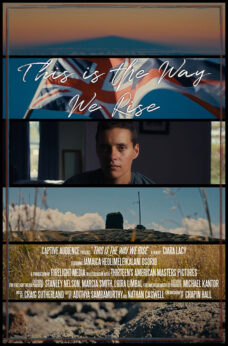
The Tidal Wave of Indigenous Cinema continues to swell with Hawaiian filmmaker Ciara Lacy’s stirring This is the Way We Rise, a poetic short about Polynesian slam poet Jamaica Heolimeleikalani Osorio that recently screened as part of the Sundance Film Festival. Jamaica is the daughter of Jon Osorio, Dean of Hawaiʻinuiākea School of Hawaiian Knowledge at the University of Hawaiʻi, an author and renowned songwriter who composed one of my three favorite Aloha “State” songs, “Hawaiian Soul,” about the fabled Native activist George Helm.
It seems that Jamaica has picked up not only her talented dad’s way with words but also his commitment to the struggle for the liberation of the Kānaka Maoli (Indigenous people of Hawaiʻi). In Rise we see Jamaica perform slam poetry at various venues, including Nuyorican Poets Café in Manhattan and the White House for the Obamas and their daughters (the former president, of course, was born in Oahu—not that he ever lifted a finger to help the Hawaiians that I know of).
In addition to live performances of her poetry, onscreen Jamaica also muses on the creative process of wordsmithing and reciting her eloquent epistles at slam fests and the like. However, she eventually runs out of things to say and comes up against that scary scourge of scribes: writer’s block. She solves her creative snafu by joining Hawaiian protests against the establishment of the proposed TMT telescope at an observatory atop Mauna Kea on the Big Island.
 On the frontlines, like a Kānaka Maoli Mayakovsky, she recovers and rediscovers her voice. At the request of demonstrators, Jamaica performs a spoken word composition and, inspired by her people and the cause, goes on to compose reams of poetry. In doing so the documentary depicts the interconnection between art and dissent and explores the role of the politically engaged artist.
On the frontlines, like a Kānaka Maoli Mayakovsky, she recovers and rediscovers her voice. At the request of demonstrators, Jamaica performs a spoken word composition and, inspired by her people and the cause, goes on to compose reams of poetry. In doing so the documentary depicts the interconnection between art and dissent and explores the role of the politically engaged artist.
Lacy’s short creatively expresses an Indigenous aesthetic and point of view. Surprisingly, the director told me she hadn’t studied film (according to Ciara’s website—Ciara Lacy | DIRECTHER + PROVOCATEUR—she majored in psychology at Yale), yet Rise uses many filmic techniques, notably split and multiple screens, and has a highly cinematic sensibility. She also evokes and cleverly visualizes poesis—the act of creating poetry—onscreen.
Lacy has produced and directed reality TV shows and the visceral Out of State documentary, which aired on PBS’s great Independent Lens nonfiction series, about Hawaiʻi inmates shipped far from home to prisons on the “mainland.” She says Rise marked the first time she’d used archival material. With black and white and color vintage footage, she covers lots of Hawaiʻi’s history, which is necessary to counteract the islands’ PR image as a tourist paradise and bestows insight into Jamaica’s poetry and what makes this committed artiste, who self identifies as LGBTQ, tick.
In fact, so much ground is deftly, swiftly covered onscreen that it’s hard to believe this film is only about 12 minutes long. My favorite clip was of the fiery Hawaiian nationalist Haunani-Kay Trask declaring: “We are not Americans! We will die Hawaiians! We will never be Americans!” I believe I was at Downtown Honolulu’s Iolani Palace in January 1993 when Haunani made these bold proclamations at mass protests during the 100th anniversary of the overthrow of the independent Hawaiian kingdom. (According to Lacy, this blast from the past was shot by her Polynesian picture-making predecessors in Nā Maka o ka ‘Āina, or Eyes of the Land.)
In addition to being a poet and activist, Jamaica teaches courses on Hawaiian politics at the University of Hawaiʻi [see: Jamaica Osorio – Department of Political Science, UH Mānoa (hawaii.edu)], where she introduces the inimitable Haunani to students. Although Professor Trask was mainly known as an activist and scholar, she was also a poet and Ms. Osorio seems to be following in her nationalistic and artistic footsteps, a tough act to follow, to be sure.
Stanley Nelson, the great African-American documentarian whose stellar films include 2015’s The Black Panthers: Vanguard of the Revolution, has an executive producer credit for Rise. Julia Pontecorvo has a series producer credit (as of this writing I have not been able to confirm whether she is related to the great Italian filmmaker Gillo Pontecorvo, who directed the 1966 revolutionary classic The Battle of Algiers, but I wouldn’t be surprised if they are kin, given Rise’s subject matter about another colonized, oppressed people).
As alluded to at the top of this review, Rise is part of the growing trend of Pacific Islander filmmakers making their own productions about their own selves. Rise marks an important step forward in the development of this aspect of the South Seas Cinema genre. Self-determination means the self, not outsiders, determining how he/she/it is presented. The Hawaiian female director Lacy and poet Jamaica are clearly important rising talents audiences should keep their eyes (and ears!) on.
Viewers may not still be able to watch This is the Way We Rise as part of the 2021 Sundance Film Festival, which has ended. But for further information, see here. The trailer can be seen here. Other opportunities to view the film will certainly arise. Another Hawaii production at Sundance was Christopher Makoto Yogi’s feature I Was a Simple Man, starring Constance Wu of Crazy Rich Asians. For more information on that film, see here.










